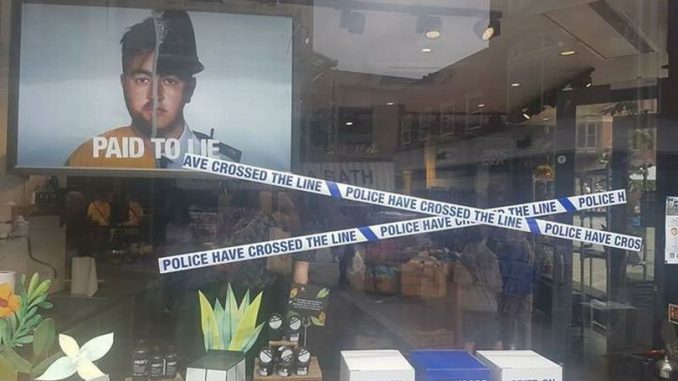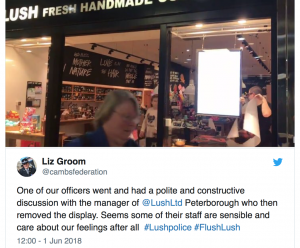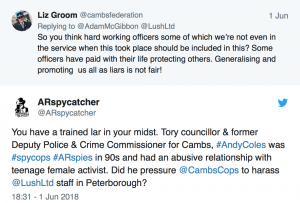
The past week has seen the issue of spycops has received more media attention by the media than at any time. Yes there was extensive coverage in the press, tv and radio when Theresa May announced the public inquiry in 2014 but the fallout over Lush’s Paid to Lie campaign was mainly driven by social media. So what happened?
What links Lush, a company most associated with cosmetics/bathbombs, etc, with undercover police in political campaigns, you might ask? Since its formation in the mid nineties Lush has funded grass roots activism, especially animal rights and environmentalism, and drawn attention to political campaigns across its stores.
All large companies like to give money to “good causes” to improve their public image and we should be wary of struggles being co-opted by corporate backers but Lush’s track record shows it’s different. First it works with activists’ groups and doesn’t try to take them over. Second it supports the sort of causes PR firms would avoid, for example the pro immigration No Borders, saying “a bold statement and one that was written in the windows of all 95 Lush shops in the UK in 2011.” So it isn’t afraid of courting controversy.
Paid to Lie was many months in the making. Spycops activists from the groups Police Spies Out of Lives and Campaign Opposing Police Surveillance (COPS) worked with the company to ensure the campaign was as relevant and effective as possible. It centred on telling the stories of several women who were deceived into intimate relationships with infiltrators and calling on the needs of victims to be put centrestage at the public inquiry.
The campaign went live on 31 May with Lush’s website saying: “The campaigners have laid out their demands, and are now joining together with Lush to get their message spread further.” A link to a change.org petition started by COPS called on Home Secretary Savid Javid to “INSTRUCT a panel of experts to assist the Chair, EXTEND the inquiry to include Scotland, DISCLOSE the cover names of the officers, the names of the groups they spied on and RELEASE the personal files of victims.”
Almost immediately came a backlash on social media, led by groups representing the police. The Police Federation of England and Wales was at the forefront. Its vice-chair Che Donald tweeted: “This is very poorly thought out campaign @LushLtd & damaging to the overwhelmingly large majority of #police who have nothing to do with this #undercover enquiry. I will now clear my house of any of your products and my family and friends will never use them again. #FlushLush.” This set the tone for opposition.
A group on Twitter called UK Cop Humour clearly didn’t see the funny side and tweeted: ‘The latest ‘advertising’ campaign by LUSH UK….. ![]() You might now expect a 100% reduction in calls to the Police, given that they’re displaying their contempt in their shop windows…”. Mostly the anger was directed at the window display, a large poster of a police officer – half of whom was in uniform, the other half in normal dress – along with hazard tape saying “police have crossed the line” .
You might now expect a 100% reduction in calls to the Police, given that they’re displaying their contempt in their shop windows…”. Mostly the anger was directed at the window display, a large poster of a police officer – half of whom was in uniform, the other half in normal dress – along with hazard tape saying “police have crossed the line” .
Over the weekend the social media storm was in full swing. Indignant tweets, furious messages penned, and thousands of police supporters leaving poor reviews on Lush’s Facebook page, down-rating it to 1.5 stars. People objected to all police officers being branded as liars, along with comments about how brave, trustworthy, caring and underpaid they are. Some were from cops themselves or their families/friends, others from people who obviously just adore the police. Lush quickly issued a statement denying the campaign was anti-police but the outcry continued with mainstream media outlets running the story in newspapers, tv and radio.
The police went even further, however. The Police Federation – which provides financial support for spycops involved in the public inquiry – complained to the Advertising Standards Authority. Its statement said it had “been contacted directly by hundreds of police officers from the four countries of the United Kingdom who, like us, find the campaign distasteful, offensive and consider it deliberately provokes an anti-police sentiment.” The ASA said it could not adjudicate as Paid to Lie was outside its remit.
The chair of Cambridgeshire Police Federation Liz Groom tweeted: “One of our officers went and had a polite and constructive discussion with the manager of @LushLtd Peterborough who then removed the display. Seems some of their staff are sensible and care about our feelings after all #Lushpolice #FlushLush.”
Accompanying her tweet was a photo of the display being taken down. Responses included: “this is utterly dystopian. Your feelings may be hurt but people’s lives have been ruined. You’re a disgrace”. Another person said: “You used your position of power to prevent legitimate criticism of the police? That’s awful. It’s bad enough that Police officers lie and spy on people. It’s rubbing salt into the wound when you tell us not to talk about it.”
Peterborough is home to disgraced Tory councillor Andy Coles. He stepped down as Deputy Police & Crime Commissioner after he was exposed as Andy Davey,who infiltrated animal rights groups and deceived a teenage female activist into an intimate relationship. Coles is feeling the pressure due to a local campaign demanding his dismissal from the council. Since July 2017 the public gallery has been off limits during council meetings due to heckling from irate onlookers. Coles would have been hugely embarrassed by the display in his local store and no doubt wanted to removed so I asked Groom on Twitter if he was behind the harassment of Lush staff. She did not reply.
Not only was Lush under attack from police chiefs, it also fell foul of the recently appointed Home Secretary, Sajid Javid. He tweeted: “Never thought I would see a mainstream British retailer running a public advertising campaign against our hardworking police. This is not a responsible way to make a point.” Labour’s Shadow Minster for Policing Louise Haig also followed suit.
Nevertheless it would be inaccurate to say the reaction was entirely one-sided. There was also support for Paid to Lie. After the initial furore, Lush’s Facebook rating began creeping up as reviews were left by customers and supporters who approved of the campaign. The typical comment was along of the lines of “I’m going to support Lush and buy their products”. Many tweets like this were posted on #spycops.
Campaigners also began fighting back, including victims of police spies. “Alison”, one of seven women who successfully sued the Met over undercover police and received a full apology and compensation, ripped into Javid in the Guardian:
While I accept that those members of the public with no knowledge or understanding of the wrongdoing perpetrated by these units may have initially misread the central campaign image, I do not believe this is true of the home secretary. He understands exactly what this campaign is about. He knows exactly what we’re asking of him, and instead of responding to requests to discuss our concerns, he ignores us and rubs salt into our wounds by attempting to delegitimise our campaign aims.
Andrea (not her real name), deceived into a relationship with SDS agent Carlo Neri, gave an excellent performance on the Victoria Derbyshire Show on ITV on Monday morning. Two days later a letter from two spycops’ ex-wives appeared in the Guardian. They applauded Paid to Lie for “bringing this issue to the attention of the general public”, said it had “achieved far more in a weekend than the inquiry has in three years’ and added: “We would like supporters of the police who are criticising Lush to be aware that we, as affected police ex-wives, endorse the points that Lush are now publicising.”
The Guardian also reported that the son of spycop Bob Lambert had spoken out. His mother, Jacqui, was deceived into a longterm relationship with Lambert when he infiltrated the animal rights movement in the eighties. She and her son only discovered the truth about him in 2012. Now in his early thirties, the son (who wishes to remain anonymous) said: “I am really grateful to Lush for bringing undercover policing back to the spotlight. Seeing Sajid Javid try and use it to win favour with the police by calling on Lush to withdraw their campaign has really upset me.”
The following day, however, Lush announced that “for the safety of our staff, we have suspended the window.” The Independent said: “All signs of the campaign, including posters, postcards, logos and mock police tape are being pulled from stores.” A few days earlier Lush had released a statement explaining that posters had been removed in some branches due to “intimidation of our shop staff from ex-police officers and unhelpful tweets from those in high office.”
Conclusion
The last week has been unique in the whole spycops saga. An issue that existed on the periphery of news reportage, rumbling along beneath the surface for years, suddenly burst into the spotlight. What lessons can be drawn from Paid to Lie?
First, Lush took a gamble by running such a controversial campaign. Though the company is different to others on the High Street, it is still a capitalist, profit-making concern. Unpopular causes have been supported in the past but none attracted the hysteria of this one. Lush had to back down, not only due to fears for its staff but also for the sake of its public image and the damage to its revenue stream. The Lush “brand” was becoming tainted and senior management could not allow that to happen. Conclusion: there are limits to what can be achieved by “caring capitalism”.
Second, the establishment got very worried. The spycops scandal undermines the cosy consensus fostered by the ruling class which sees the state, especially its police force, as impartial upholders of justice and law and order. This campaign highlighted another side to the “thin blue line”, an altogether uglier, more uncomfortable truth was presented to shoppers on high streets and shopping malls up and down the country. Yes the police are criticised and disturbing stories of malpractice and wrongdoing are sometimes aired in the media, but these are pigeonholed, kept in their place. We might read about police brutality or corruption in the press or on social media, hear a report on the radio but to have depicted in a forthright way while we are shopping is clearly a step too far. Conclusion: when alarmed, the ruling class will lash out.
Third, the sheer amount of misinformation thrown at the campaign beggared belief. Within hours the assumption was made – wrongly – that this was an attack on every copper in the country, all bobbies on the beat, those fighting to stop terror plots. This lie was cultivated and spread by policing bodies, principally the Police Federation of England & Wales and its branches, all the way up to the Home Officer and its secretary of state, Sajid Javid.
Labour joined in as well the form of Shadow Policing Minister Louise Haig. Although John McDonnell spoke out in defence of Lush, other key figures in the party – including shadow minister for home affairs Diane Abbot – remained silent. This was pretty much the whole political elite, including all major media outlets, whipping up a state of frenzy via social media and irate customers – many of whom were serving or ex-police officers – venting their anger at staff. Conclusion: it seems free speech and the ability to question those in power has its limits.
Fourth, though the central message of spycops was diluted by hysteria and outrage, it did manage to enter the mainstream of society for the very first time. That it provoked such a reaction shows how inherently dangerous and disturbing it is to those in power. Critics latched onto the poster with the half cop, half spy photo, claiming it accused all police of lying, but would they have been happy with another image? Does the Police Federation want any reminder of secret undercover units spying on people, invading their lives, fathering children, in public places in towns and cities? Of course not!
I suspect nearly all the victims of police spies and those campaigning on their behalf supported the campaign and are glad it went ahead in the form it did. Better that than some watered down, apologetic version, tucked away at the back of the premises, where only those who knew where to look could find it. It was bold, unashamed and in your face, just as it should be. Scandals of any sort need this approach, they should be uncovered in as loud and public a way as possible. Conclusion: spycops is all about concealment and deception, it does not enjoy the oxygen of publicity.
Finally, if we ever needed to know – and I’m sure most of us were aware anyway – what we are up against, this should serve as a salutary reminder. Undercover police is the state at its most deceitful and manipulative and we must be under no illusions that the gloves are off and it will resort to every dirty and despicable trick in the book.


Leave a Reply